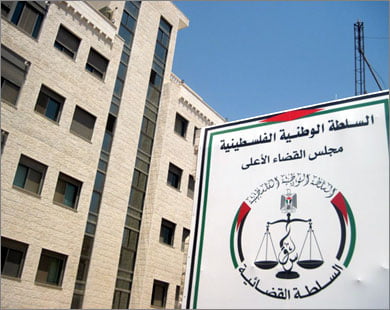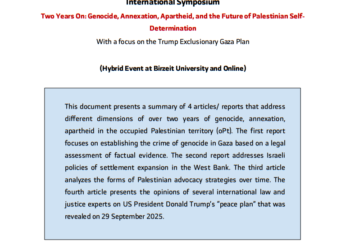Can Palestine sue Israelis in its courts? Legal reading in light of the Palestinian minister of justice’s statements for prosecution of Israeli settlers
By: Nasser Thabet
For: Law for Palestine
In a notable statement on 14th of Oct. 2020, the Palestinian Minister of Justice Mohammad Shalaldeh said that within days the Palestinian Judiciary will begin looking into cases of violations committed by Israeli settlers against Palestinians and their properties, affirming that work is underway to collect criminal evidence to file the first cases to convict a group of settlers, whose names are known of committing crimes and violations against Palestinians in the old city of Hebron and Burin village, south of Nablus.
Shalaldeh confirmed that the Palestinian cabinet had issued a decision to form a national team for accountability and prosecution of settlers who commit crimes against the Palestinian people before Palestinian courts and that in the wake of the ending of agreements and understandings with Israel and the United States, declared by Mahmoud Abbas.
In reality, this Palestinian stance – if it becomes a reality – represents a major turning point on the Palestinian scene, especially regarding the PA’s relationship to the occupation. This is because the Palestinian Authority, since its establishment in 1993 under the Oslo Accords, has not prosecuted Israelis in its courts. That is to say, it is inconceivable that Israel, having the greater military advantage, would allow the prosecution, but also because the Palestine Liberation Organization (PLO) agreed, according to the Oslo Accords itself, to abstain from prosecuting any Israeli individual.
Thus, this position is the first of its kind since the Oslo Accords, as no Palestinian official body had previously announced its intention to prosecute Israelis, except in a unique judicial decision issued at the beginning of 2015[1] by the Criminal Division judge in the Jenin Magistrate Court. The judge was Ahmed Al-Ashqar, and his decision was made in response to an appeal filed by a defendant holding the Israeli citizenship. The defendant made the claim that Palestinian courts do not have jurisdiction in his case. However, the judge rejected this appeal and decided to proceed with the case following legal principles, stressing that the Oslo Accords has rendered itself null by its nature as a temporary agreement; hence, the Oslo Accords, in his view, is legally void from years ago. Therefore, the PA has the jurisdiction to litigate crimes that take place in the Palestinian territories, even if the offender is Israeli.
However, this decision did not turn into a practical reality at that time, as the Palestinian Supreme Judicial Council rejected this decision, and said in a statement issued at the time that the magistrate was not the authority to decide on the issue of the implementation of the Oslo Accords, because this issue is political, and hence should be decided on by the Palestinian leadership and not by any judicial authority.
However, to what extent it is conceivable that this statement will turn into a practical reality today? Does Palestine have the right, from a legal standpoint, to sue Israelis in its courts ? Or are there legal obstacles that prevent Palestinian courts from exercising their jurisdiction over Israelis?
First: The legal foundations that the Palestinian Minister of Justice relied on in his statement to prosecute Israelis
In his press statement, the Palestinian Minister of Justice justified the ability of Palestinian courts to prosecute Israelis who commit crimes against Palestinians on a set of foundations, as follows:
- Statehood of Palestine and its sovereignty over its lands:
Where the Minister of Justice considered that this step comes to consecrate the concept of state sovereignty over the occupied territory, and to complement the acceptance of Palestine as a non-member state in the United Nations, in addition to strengthening the concept of jurisdiction over the occupied Palestinian territory.
- Palestinian Basic Law:
Under Article 30 of the Palestinian Basic Law, “[s]ubmitting a case to court is a protected and guaranteed right for all people. Each Palestinian shall have the right to seek redress in the judicial system.” For that, the Palestinian Basic Law gives victims the right under local Palestinian laws to go to Palestinian courts to seek redress.
- Palestinian Code of Civil and Commercial Procedures:
As stipulated in the Code of Civil and Commercial Procedures in Palestine, it’s possible to claim civil liability for negligence, related to compensation for damage. Article 27 of the aforementioned law stipulates that the courts in Palestine shall have jurisdiction over cases filed against a foreign nationals residing in Palestine. This description applies to Israeli settlers, who live in settlements built on West Bank territory. Article 28 also stipulates that Palestinian courts also have jurisdiction in cases that are brought against a foreigner, even if he/she does not have a place of residence in Palestine if the case is related to money found in Palestine. This characterization applies to Israeli officials who do not live in West Bank settlements, but who, for example, are responsible for issuing approval orders for the confiscation of Palestinian land or the demolition of Palestinian properties and homes.
- International conventions and treaties:
In his statement, the Minister of Justice pointed out that when deciding on victims’ files, Palestinian judges will not rely solely on Palestinian legislation, but also on international agreements and treaties to which Palestine has acceded, and to which Israel, the occupying Power, has signed. In this context, the minister referred to Article 146 of the Fourth Geneva Convention. This article requires states to enact national legislation in their laws to prosecute perpetrators of war crimes, regardless of the location of the crime or its nationality (universal jurisdiction).
- The principle of authoritative judgments:
Where the Palestinian Minister of Justice indicates that the rulings issued by the Palestinian judiciary, if they are not implemented and respected by the occupation authorities, will be a pretext and evidence for their implementation before the countries whose nationalities are settlers, given that most of the settlers carry nationalities other than the nationality of Israel, to implement them in case Their entry into its territory, according to the rules of private international law, and the rules of international cooperation in the pursuit of criminals.
- The supplementary jurisdiction of the International Criminal Court:
The Minister of Justice pointed out that the rulings of the Palestinian courts will support the Palestinian case before the International Criminal Court, whose founding system stipulates the principle of the complementary jurisdiction of the court, meaning that if the victims of violations have exhausted all the national constitutional procedures without having their rights fair, or implementation is impossible, they can then appeal to the International Criminal Court. Consequently, the principle is that the local (national) judiciary is the one who has jurisdiction, and if he is unwilling or unable to prosecute, then the international criminal law can be resorted to.
Second: The legal frameworks for Palestinian courts to exercise their judicial authority over Israelis – the possibilities and the obstacles
The one who looks at the unique reality of the complex Palestinian situation is dependent on a set of agreements and treaties that define the behavior of the Palestinian National Authority in a certain framework, in addition to the existence of the occupation and the lack of full Palestinian sovereignty over the Palestinian territories, which made Palestinian courts look into crimes committed by Israelis facing A set of obstacles that we can discuss are as follows:
- The Israeli-Palestinian Agreements (Oslo and its aftermath):
Bilateral agreements between the Palestine Liberation Organization and Israel made it possible for the Palestinian judiciary to try the Israelis. The 1995 Taba Agreement stipulated in its Article (17/4 / A) that the territorial jurisdiction of the Council [the Authority] extends to all individuals except the Israelis. This means that the Palestinian courts have no personal jurisdiction over the Israelis, and that includes, of course, settlement residents.
Besides, Palestinian courts will not be able to hear crimes in Area C, which represents 60% of the West Bank, because the transfer of jurisdiction over these areas was supposed, according to Articles 1 and 17 of the Taba Agreement and what follows it. In subsequent stages, and until this is done, Israel will continue to exercise its powers and responsibilities that have not been transferred.
In light of this, it is inconceivable that Palestine will try the Israelis as long as it is committed to the Taba Agreement and other Palestinian-Israeli agreements. Is the authority no longer bound by these agreements?
Last May 19, Palestinian President Mahmoud Abbas declared that Palestine is in a solution of all agreements and understandings with the American and Israeli governments, including security. This statement prompted the International Criminal Court to request an explanation from Palestine about it. On June 4, 2020, the Palestinian Minister of Foreign Affairs submitted an explanatory memorandum upon the court’s request, and the memorandum clarified in paragraph 13 what was stated in President Abbas’s statement, and affirmed that If Israel undertakes the annexation, it will cancel any effects of the Oslo Accords and all other agreements concluded between them. Israel’s continued violations of these agreements, its plans, and the declared annexation measures exempt the Palestine Liberation Organization and the State of Palestine from any obligation arising from these agreements, including security agreements.)
Later, Palestinian Prime Minister Muhammad Shtayyeh said in an official cabinet session that they would work to complete the plans related to the Palestinian leadership’s decision to stop the implementation of the Oslo Accords since Israel had announced and started practicing some annexation measures for some Palestinian lands. In a press release by the Palestinian Ministry of Foreign Affairs, it said that the occupation authorities are continuing to implement the annexation decision gradually and under various names and that the statements of postponing the annexation are false. In another statement by the Palestinian Prime Minister, he said that the Authority is considering dealing with all Palestinian areas as Area (A). Even in the aforementioned Minister of Justice’s statement regarding starting the prosecution of settlers, the minister indicated that this decision comes based on President Abbas’s decision to disavow the agreements.
However, in November 2020, official Palestinian announced that the relationship with Israel ‘will return to how it was’ after ‘written and oral letters we received’ confirming Israel’s commitment to past agreements. Thus, in reality, it is inconceivable that the Palestinian Authority would sue Israelis as long as it is committed to the Oslo Accords and other agreements.
Indeed, if the Palestinian Authority wants to actually begin prosecuting Israelis, it must first take official measures in regard to the Oslo Accords and other Palestinian-Israeli agreements. In light of international treaties, for inter-state agreements termination to have its legal effects, the legal way for that, according to Article (65/1) of the Vienna Convention on the Law of International Treaties is to notify the other party of this formally. Article (67/1) of the Convention stated that (the notification stipulated in Article 65, paragraph (1), must be in writing).
If the Palestinian Authority wants to actually begin prosecuting Israelis, it must first take official measures in regard to the Oslo Accords and other Palestinian-Israeli agreements
Thus, for Palestine to be free from the obligations arising from the Oslo Accords, Israel must be notified in writing that Palestine has suspended the work of the agreements concluded between them, and this has not been done so far.
- Palestinian laws
As mentioned above, and through what the Minister of Justice stated, a Palestinian can resort to the judiciary, according to Palestinian local laws, regarding any crime that occurred in the Palestinian territories or any right related to money existing in the Palestinian territories.
However, what should be noted here is that the statement of the Minister of Justice and the context of his speech were referring to the claim for civil liability, relating to compensation for damage and compensation for the civil affair, while he did not mention or refer to what is related to punishing crimes under the rules of the Palestinian Criminal Law. It appears from the Minister of Justice’s statement that what Palestine thinks about is related to civil and not criminal cases, as he considered that in the most serious cases committed against the Palestinian people, it is possible to refer to the International Criminal Court.
However, the reality is that the rules of Palestinian criminal law also allow Israelis to be tried for crimes committed in the Palestinian territories. According to the text of Article (163) of the Palestinian Code of Criminal Procedure, jurisdiction must be given to the place where the crime occurred, or where the accused resides, or where he is arrested.
However, the rules of the penal code, whether applied in the West Bank or the Gaza Strip, punish ordinary crimes that are included in those laws, but they do not include provisions for international criminal crimes, like Palestine, after signing the Rome Statute and several international agreements, did not harmonize Palestinian laws with the law The International Law and the Rome Statute, by amending the penal code to include the most serious crimes and punish them. This requires the authority to make this amendment or to put in place a special law to punish the most serious crimes such as war crimes and crimes against humanity. Until such an amendment is available[2], Palestinian courts will remain competitive if an Israeli person commits one of the ordinary crimes punishable by the penal code applied in Palestine (such as crimes of murder and victimization, for example).
- Occupation law (international humanitarian law):
According to the rules of international humanitarian law, which apply to the occupied Palestinian territories, Palestinian courts naturally have jurisdiction over crimes committed in their territories despite the existence of the Israeli occupation. According to the text of Article (64) of the Fourth Geneva Convention: The courts of the occupied territories shall continue their work concerning all the violations stipulated in this legislation.
The only exception to this rule, under Article 64 itself in addition to Article 66, is that the occupier may submit to the inhabitants of the occupied territories the laws he imposes on them that are necessary to enable him to fulfill his obligations as an occupying power under the Geneva Convention. If these laws are violated, those who violate them can be tried before courts are formed by the occupying power.
Thus, it seems clear that there is nothing per the rules of international humanitarian law that prevents Palestinian courts from trying Israelis who commit violations in violation of Palestinian laws. Also, it seems clear that the occupation has not shown, through its practices, any serious behavior towards the prosecution of perpetrators of crimes against Palestinian settlers and Israelis, and in the words of B’Tselem and Yesh Din: Israel is not interested in investigating violations committed against the Palestinians, which makes The Israeli perpetrators are in a situation of lack of real accountability by the Israeli judiciary.
According to the international humanitarian law rules, there is nothing that prevents Palestinian courts from prosecuting Israelis who commit crimes in violation of Palestinian Law
- The International Criminal Court
The position of the Prosecutor of the International Criminal Court appears to support the idea of Palestinian jurisdiction in the trial of Israelis. Indeed, due to Palestine’s inability to prosecute Israelis who are believed to be committing war crimes in practice, it submitted its credentials to join the International Criminal Court in 2014. On May 22, 2018, Palestine referred the situation on its territory to the court. In light of this, the Prosecutor announced to the court on 20 December 2019 that she had found a reasonable basis to initiate an investigation into the crimes committed in the Palestinian territories, and submitted a request to the Pre-Trial Chamber to decide on the court’s jurisdiction over the territorial scope of the Palestinian territories.
What concerns us here is the position of the attorney general of the court concerning the Oslo Accords and their aftermath, and to what extent Palestine’s relinquishment of trying the Israelis under those agreements would be an effective obstacle to trying the Israelis. In this context, we find that the Attorney General considered that there is nothing in the Oslo Accords that prevents Palestine from accepting the jurisdiction of the International Criminal Court, or the exercise of this mandate by the court. The Prosecutor stressed that the Occupied Palestinian Territory must have sovereignty (and this includes sovereignty from the judicial point of view), and this sovereignty belongs to the Palestinian people under occupation, as Israel cannot claim sovereignty over it, as an occupying power. Accordingly, the Attorney General concluded that it is preferable to view the Oslo Accords as including a delegation of jurisdiction by Palestine to Israel concerning the trial of Israelis, but that did not represent and cannot constitute a waiver of that mandate.
This means, from our point of view, and based on the position of the attorney general of the court, that the original jurisdiction to prosecute in Palestine is the Palestinian local courts, and that Palestine’s waiver of that under the Oslo Agreement and its successors represents a ‘mandate’ for the Israeli courts in this field, and Palestine can withdraw This authorization whenever she wants, as the owner of the principal jurisdiction.
Conclusion
In light of the foregoing, it can be said that Palestinian courts have the legal authority to prosecute Israeli perpetrators of crimes, but this requires, starting with Palestine, that it notify Israel of stopping the implementation of the bilateral agreements concluded between them in writing so that the restriction contained in these agreements on Palestine’s exercise of its judicial authority is removed. Officially on the Israelis. Besides, to be able to prosecute war crimes, Palestine should amend its national legislation and enact laws on international crimes. In all cases, the inability of Palestine realistically to enforce the judgments that may be issued by its courts, which may include orders to arrest Israelis, seize the property of their own, or to find them, keeping the International Criminal Court competent to hear these crimes.
Rather, the inability of Palestine to exercise that jurisdiction over the perpetrators of crimes that fall within its territory, for reasons related to the conventions and because of the belligerent occupation regime, and in light of the failure of Israel to fulfill its legal duty to prosecute those crimes committed by its citizens, and even clarify these policies in many Sometimes, as in the case of settlements, it is the one that pushed Palestine to refer the situation to the International Criminal Court according to its membership in it, and it is the legal basis on which the court can base its progress in the investigation, under Article 17 of the Rome Statute.
Resources
[1] See Jenin Peace Court, Penal Case No. 885 of 2014. Date of judgment: 11/1/2015.
[2] What can be taken in here, is the decision of the Supreme Constitutional Court in Palestine (2017) that international agreements are superior to domestic legislation, and that the State of Palestine should give consideration to the rules of international law even if it has not been incorporated into the internal laws. Based on this, Palestine can punish the crimes stipulated in the Rome Statute even if it does not establish special legal rules in its domestic law to regulate this.







